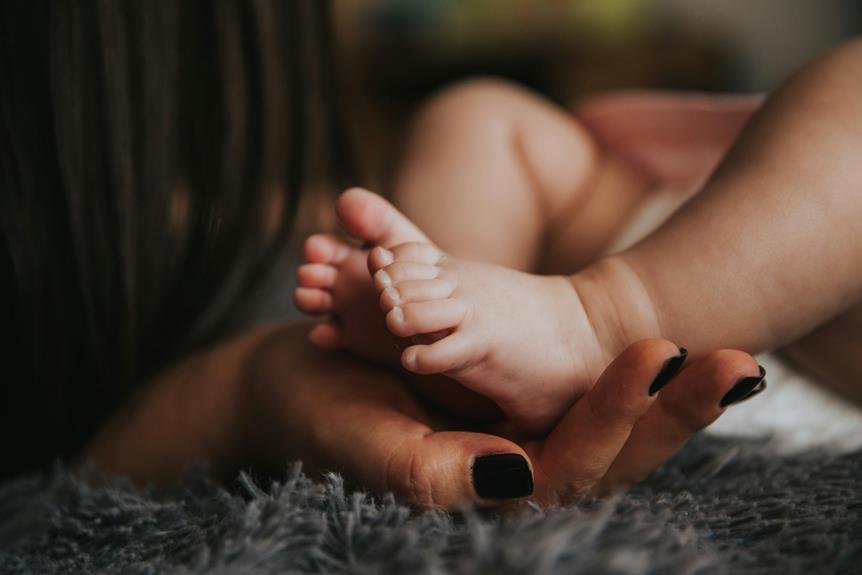
When it comes to caring for your baby's sensitive skin, the choices you make can greatly impact their overall well-being. Certain baby care products can either nurture or irritate delicate skin, so it's essential to be mindful of what you're using. By understanding the specific needs of sensitive baby skin and selecting the right products tailored to those needs, you can provide the best care possible. But how do you navigate the sea of options available and ensure you're making the safest choices for your little one's skin?
Understanding Sensitive Baby Skin
If your baby has sensitive skin, understanding the specific triggers and reactions can help you choose the right products for their care. Sensitive skin in babies can manifest in various ways, such as redness, dryness, itching, or even rashes. Identifying what causes these reactions is crucial in providing the best care for your little one.
Common triggers for sensitive skin in babies include fragrances, dyes, harsh chemicals, and certain fabrics. When these irritants come into contact with your baby's skin, they can cause discomfort and reactions. Pay close attention to how your baby's skin reacts to different products and environments to pinpoint what may be causing sensitivity.
Additionally, factors like weather changes, heat, or cold can also impact your baby's skin condition. Keep your baby well-hydrated and moisturized, especially during dry or harsh weather conditions. Choosing gentle, hypoallergenic products specifically formulated for sensitive skin can also make a significant difference in managing and preventing skin irritations.
Choosing the Right Baby Cleanser
To ensure proper care for your baby's sensitive skin, selecting the appropriate baby cleanser is key. When choosing a baby cleanser, opt for gentle, fragrance-free formulas specifically designed for sensitive skin. Look for cleansers that are hypoallergenic and free from harsh chemicals, such as sulfates and parabens, which can irritate delicate skin. Check the ingredients list and avoid products with artificial dyes or perfumes that may trigger allergic reactions. It's essential to choose a mild cleanser that will effectively cleanse your baby's skin without stripping away its natural oils or causing dryness.
Consider trying a liquid cleanser over a bar soap, as liquid cleansers tend to be more hydrating and less abrasive. Additionally, look for cleansers that are pH-balanced to help maintain the skin's natural barrier and prevent irritation. Remember to patch test any new cleanser on a small area of your baby's skin before full use to ensure it doesn't cause any adverse reactions. By selecting the right baby cleanser, you can help keep your little one's sensitive skin clean, healthy, and happy.
Nourishing Baby Lotions and Creams
When selecting nourishing baby lotions and creams for your little one's sensitive skin, prioritize products with gentle, hydrating formulas tailored to provide essential moisture without causing irritation. Look for lotions and creams that are specifically labeled as hypoallergenic and free from harsh chemicals, fragrances, and dyes. These can help prevent potential allergic reactions or skin irritations.
Opt for products that contain natural ingredients like shea butter, coconut oil, or aloe vera, as these tend to be milder and less likely to cause sensitivity. These ingredients can help soothe and nourish your baby's delicate skin without clogging pores or causing discomfort.
Ensure that the lotion or cream you choose is lightweight and easily absorbed to keep your baby's skin moisturized without feeling greasy. It's essential to apply the lotion or cream regularly, especially after baths, to lock in moisture and maintain soft, healthy skin. By selecting nourishing baby lotions and creams with care, you can help keep your little one's sensitive skin well-hydrated and protected.
Safe Sun Protection for Babies
For optimal protection against the sun's harmful rays, consistently apply a gentle, baby-safe sunscreen with a high SPF rating. Look for sunscreens specifically formulated for babies, as their delicate skin requires extra care. Opt for broad-spectrum sunscreens that protect against both UVA and UVB rays. It's recommended to choose a sunscreen with SPF 30 or higher to ensure adequate protection.
Apply the sunscreen generously to your baby's exposed skin about 15 minutes before going outside. Reapply every two hours or more frequently if your baby is sweating or in water. Don't forget commonly overlooked areas like the tops of the ears, back of the neck, and tops of the feet.
Remember to dress your baby in lightweight clothing that covers their arms and legs, and consider a wide-brimmed hat to shield their face. Avoid direct sun exposure during peak hours, typically between 10 a.m. and 4 p.m. Creating shade with an umbrella or stroller canopy can also help protect your little one from the sun's harsh rays.




